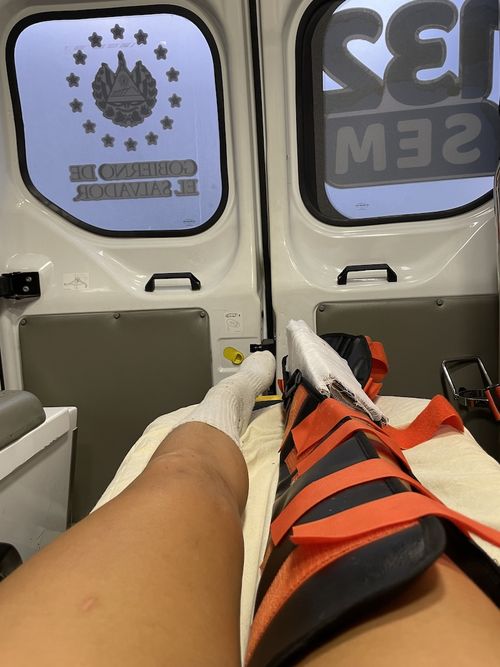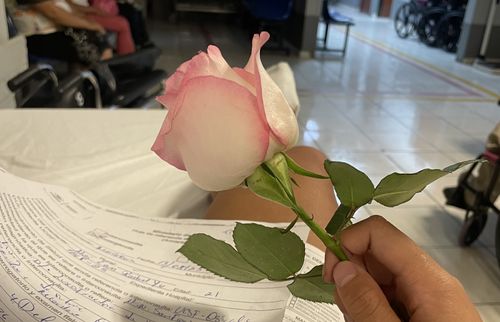Mishap
Mar 20, 2025 | Rachel Yu
Morazán, El Salvador
Background
For the first time in a very long while, I felt fear.Most people who know me would consider me a pretty brave person. It took me quite a while to identify with this label, because growing up I never thought of myself that way.
I've done quite a lot of "brave" things this year: going to a region of the world with a one-way ticket where I barely spoke the language, hitchhiking across countries, speaking Spanish on stage with a mic in front of many people. And while it is true that being brave has lead to some of the most amazing experiences in my life, There have been times when my "bravery" (recklessness with a prettier name) got me into situations I probably should've avoided, but every time I'd tell myself "Yay, I lived to tell the tale" and shrug it off.
But oh well, things always go in your favor until... they don't.
The fall
An accident/rash decision led to me lying on the ground with a broken leg in the middle of nowhere, with a guy I'd met just a few days ago while hitchhiking. My heart raced, and an unfamiliar feeling rose to my throat: fear.When I sat on the ground waiting for the pain to ease, I thought I had only twisted my ankle. Desperately trying to suppress my emotions and pretend that i was okay (I was not, my fibula was in 3 pieces), I looked at my friend, laughed out loud, and said "lo que está pasando es bien chistoso verdad." Looking back, I was trying to lighten the situation and live up to the expectation (of whom???) that I have absolutely zero fears.
But what you suppress doesn't just go away. It appears in other forms. I became mentally paralyzed.
-
Navigating an emergency situation when traveling solo is scary enough on its own. Having to speak in a language I'm not fluent in made it a whole other level.
-
Helplessness and loneliness. Even though I have so many friends in El Salvador, who wants to be carried by a friend to the toilet?
-
Identity crisis. I went from a girl traveling the world by herself to someone could barely get from one side of the bed to another.

What is this trying to teach me?
It has been one of the most stressful periods of my life, and it might be a while before I'm back on the road. I'm absolutely gutted to have to pause my adventures, to tell my friends with whom I made plans that I'm not going to make it. But as I lay flat in the hospital bed staring at the ceiling fan, I realized I could look at it two ways.I can blame the universe, be mad at myself for making such a dumb decision, dwell on the fact that I have to end my trip.
But I can also see this as an opportunity to experience the highest form of human kindness, to learn a big lesson, to teach myself how not to deny emotions, however ugly they are. It's been fascinating to observe myself as I experience all these feelings. It exposed a side of myself that I don't get to see very often, and I feel grateful that I get to know more about myself through this experience in the best, safest circumstances possible. My thoughts have become less complicated. I got to take a break from spending too much time in the mess in my head because I'm focused on learning how to walk with crutches and figuring out how to carry stuff. If anything, this is a chance for me to clear my mind and start over with a blank slate.
Buena onda
I met Alonso three days before the accident. He picked me up on his motorcycle when I was hitchhiking, and a few days later we met up again and decided to hike up a mountain together. When I got injured, we'd spent less than an hour together in total.Being the angel that he is, he has been there for me every second. When I was shaking from the pain, he immediately examined my injury, kept telling me "cálmate." He carried me all the way down the hill, took me to the hospital, did all the talking and paperwork. I spent two days in the hospital, and he was there with me the whole time. He took care of all my needs, from carrying me to the bathroom to getting me anything I needed because I couldn't move at all, to distracting me from the pain by making me read short stories in Spanish to correct my pronunciation. His family, whom I hadn't even met, made me sopa de res. All the while he kept apologizing profusely for causing so much inconvenience—I felt horrible having to rely on someone I'd just met.
After I was discharged, I lived with Alonso and his family for a few days. I felt so bad and embarrassed that I was literally a breathing blob who couldn't even pick up her own dishes. On top of that, learning to walk with crutches on uneven ground was a whole ordeal. The little things like climbing one stair or picking things up from the ground became the hardest tasks ever. I became so frustrated with myself. But Alonso and his family kept encouraging me and treating me like family, telling me that I could stay for as long as I wanted. Because of their immense kindness and generosity, the few days I spent living with them ironically became some of the best memories of my trip. Alonso and I talked ALL DAY, to the point where I felt like my Spanish improved more than ever before. When we got tired of talking, we smoked (out of an apple) and watched the sunset.
The Escotos, another family I met through hitchhiking, drove three hours to come and see me even though I repeatedly told them not to bother. I stayed one day with them and they dropped me off at the airport to catch my flight home. And from there I was on my own.
The complications of flying with a broken leg began before I even boarded. Due to unclear airline instructions and hospital bureaucracy, I nearly couldn't fly at all. After countless phone calls and negotiations, I finally secured my seat. What followed was a grueling 30-hour journey until I got home and was immediately admitted to the hospital.
Reflection
It was a lesson with a huge price.When faced with any situation, I had always asked myself "What would you do if you weren't afraid?"—and I'd go do that thing.
And I will absolutely continue to ask myself that—Now with some ground rules: no jumping from heights, no hard drugs, and no wandering off with sketchy strangers.
Things didn’t get easier in the first week of being back. I got so used to being independent and now all of a sudden I had to rely on people for everything. Granted, I have the best support system I could ever ask for and I am extremely grateful for that, but the added complications of my day-to-day brought by a broken leg has still been extremely challenging.
In the hospital I put together a plan of the things I can do at home when I recover. However, After I was discharged to the hospital and sent home, I was in the worst place ever mentally. Being at home all day is the polar opposite of my usual lifestyle, and even with all the books I was planning to read, courses I wanted to take, I found it so hard to do any of it. I don’t mean to sound oblivious and I understand that having free time is a huge priviledge, but for me, this is very scary in a different way. Nothing I did felt right, and by the end of the day I beat myself up for having ‘wasted’ a day. wash rinse repeat. And it won’t be another three months before I am back on my feet again.
As I write this, it has been two weeks since my surgery. At first, I didn't want to tell my friends I was back home—as if hiding it would make it less real. Eventually, I hesitantly reached out to some friends, and they, being the wholesome, caring, and kind people they are, came to visit me. Their support helped me tremendously in getting out of my slump and I am so grateful for them.
Post script
Something amusing happened after my surgery. When I woke up from anesthesia, I found myself crying hysterically in both English and Spanish—it was the most surreal, out-of-body experience. Throughout my ordeal, I had been suppressing all my negative emotions, forcing myself to maintain my usual happy, bubbly persona. I had gotten quite good at squashing down any fears or anxieties that surfaced, like a game of emotional Whac-A-Mole. But under the influence of anesthesia, all those carefully contained feelings broke free. Since I had been thinking primarily in English and Spanish during my travels, my emotional release came pouring out in both languages. I can only imagine how entertaining this meltdown must have been for the hospital staff.Also grateful for:
The woman and son who helped me get down from the rock and drove me to the clinic
The nurse in the clinic who told me “cuidate, loca”
My friend Veronica, whom I also met through hitchhiking, brought me crutches from the city
The EMT who gave me a rose
